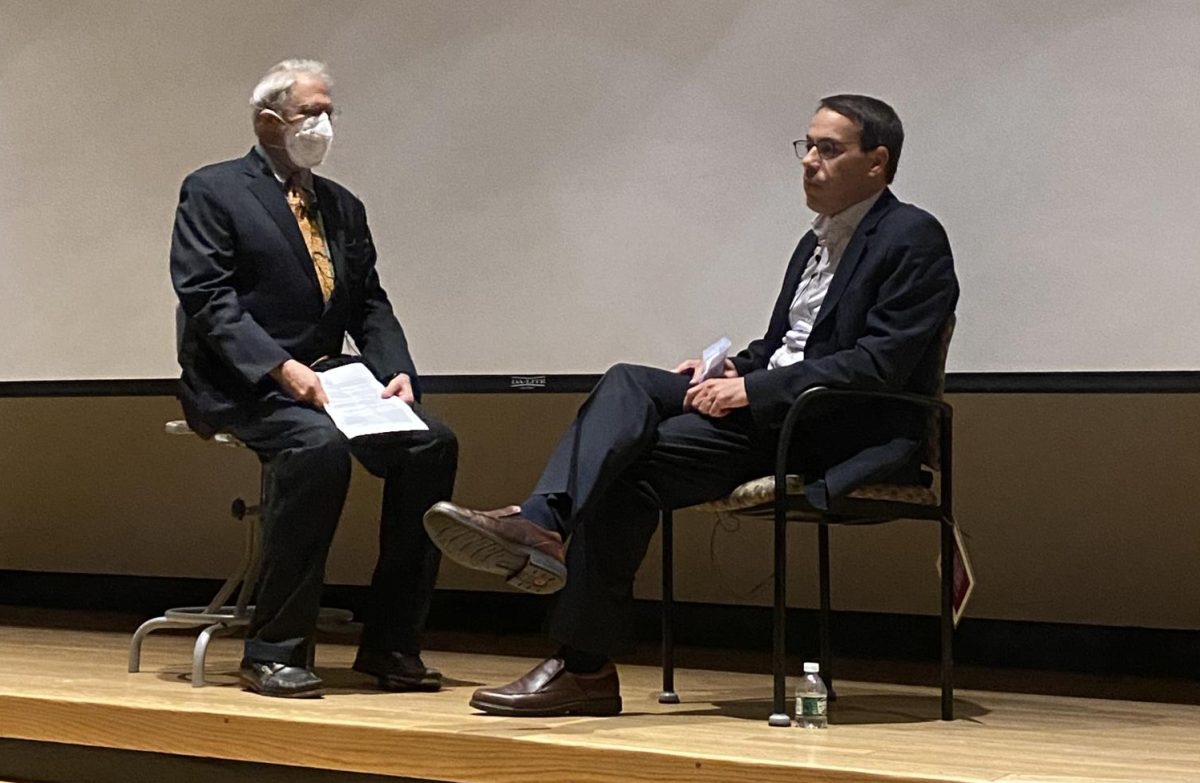On Nov. 1, The Department of Judaic and Near Eastern Studies at the University of Massachusetts hosted a talk titled “An Israeli Perspective on the Israel-Gaza Conflict,” with Dr. Jesse Ferris at Thompson Hall. Ferris is Vice President of Strategy at the Israel Democracy Institute and author of books, “Nasser’s Gamble: How Intervention in Yemen Caused the Six Day War and the Decline of Egyptian Power” and “How Israel Can Survive in a Nuclear Middle East.”
Ferris flew back from Israel the week prior and expressed that the aftermath of the Oct. 7 Hamas attack has left Israel “shaken to its core.” He said. “People here [in the United States] see the most powerful military in the Middle East bombarding Gaza, however, Israelis are sensing the echoes of the Holocaust all over again, they are experiencing fear, anger and vulnerability.”
“But there’s also a feeling of resolve amongst Israelis and a consensus that this ‘threat’ needs to be removed. Now whether it can be removed and at what price, those are complicated questions,” Ferris added.
On Oct.7, Hamas carried out an attack in southern Israel that resulted in the loss of 1,400 lives. Since then, Israel has been counter-attacking Gaza, which has killed more than 9,700 Palestinians, mostly women and children, with around 24,800 wounded, as reported by the Gaza Health Ministry.
Ferris suggested that the situation could get worse if the ongoing conflict was to evolve and become a “three-front war” with militant involvement from Yemen and Lebanon. He explained, “There have been ballistic and cruise missile attacks by Yemen and Lebanon in the past and if regional escalation were to occur again, we would witness widespread destruction all over Israel.”
He added, “It’s like a tinderbox. Any miscalculation could escalate the horror and make the situation in Gaza look like child’s play and Lebanon will suffer catastrophic damage in the process as well.”
When asked about aspects of the conflict that students at American universities should understand, Ferris emphasized the complex nature of a long-standing conflict that has spanned generations, acknowledging the challenges of being geographically distant from the region.
“After having read about the ‘controversy’ sparked on the UMass campus, I’d like the younger generation in the audience to also know that things are not black and white,” Ferris said. “You don’t have to pick a side. You could be ‘Pro-Palestinian’ and ‘Anti-Hamas,’ ‘Pro-Israel’ and ‘Anti-Bibi Netanyahu’ [and] ‘Pro-Peace’ without aligning with either side.”
The Israeli occupation of the West Bank and Gaza strip are popularly linked to southern colonialism and the Russian invasion of Ukraine. In an answer to a question about the parallels and nuances between them, Ferris said that while the International Community accepts otherwise, the West bank is a “disputed land” rather than an “occupied land.”
He elaborated on the issue of Jewish settlements and their status in the West Bank, describing it as a “significant controversy” within Israeli society.
“The official Jewish settlement project was formally terminated in 2005 with a unilateral disengagement decision. Every single one of those settlements were removed,” Ferris said.
However, the West Bank is now home to over 400,000 Israelis. Additionally, Prime Minister Netanyahu’s pledge to advance 10,000 new settler housing units earlier this year has contributed to the ongoing expansion of settlements in the region.
Ferris asserted that, “Prospects for peace remain too dim as long as actors like Hamas, funded by Iran, continue to sow mayhem, chaos and destruction, disrupting any attempts at peaceful resolution.” He stressed that no matter how much Israelis and Palestinians desire peace, the presence of “spoilers like Hamas” remains a significant obstacle to its realization.
A member of the audience raised a question about the usage of the term “genocide” to refer to the current situation in Gaza, to which Ferris replied with examples of historic massacres. “If you think of World War II, when American and British forces bombed Dresden for two days, it left 25,000 civilians dead. Consider the firebombing of Tokyo in March 1945, in one single night 100,000 people died. None of those were attempts at a genocide.”
He continues, “Every life is special, and I can’t even begin to imagine the scale of suffering under those bombings in Gaza, but calling it a genocide? That’s a completely different ballpark.”
Article II of the UN Genocide Convention defines a genocide as a crime committed with the intent to destroy a national, ethnic, racial or religious group, in whole or in part. Proving genocide usually hinges on demonstrating intent to destroy a group and in this case, Israeli leaders’ intent, as expressed by top officials, is evident in public records. In a recent interview, however, Israeli President Isaac Herzog said they’re putting a “huge focus” on reducing civilian causalities.
Following the event, as part of a discussion with some audience members, Ferris was asked whether he thinks there should be a ceasefire. In response, he stated, “No, not yet.” He elaborated, “A ceasefire from the Israeli perspective would leave both sides seriously bloody but only determined to fight another day.”
Aadvika Gupta can be reached at [email protected]



















